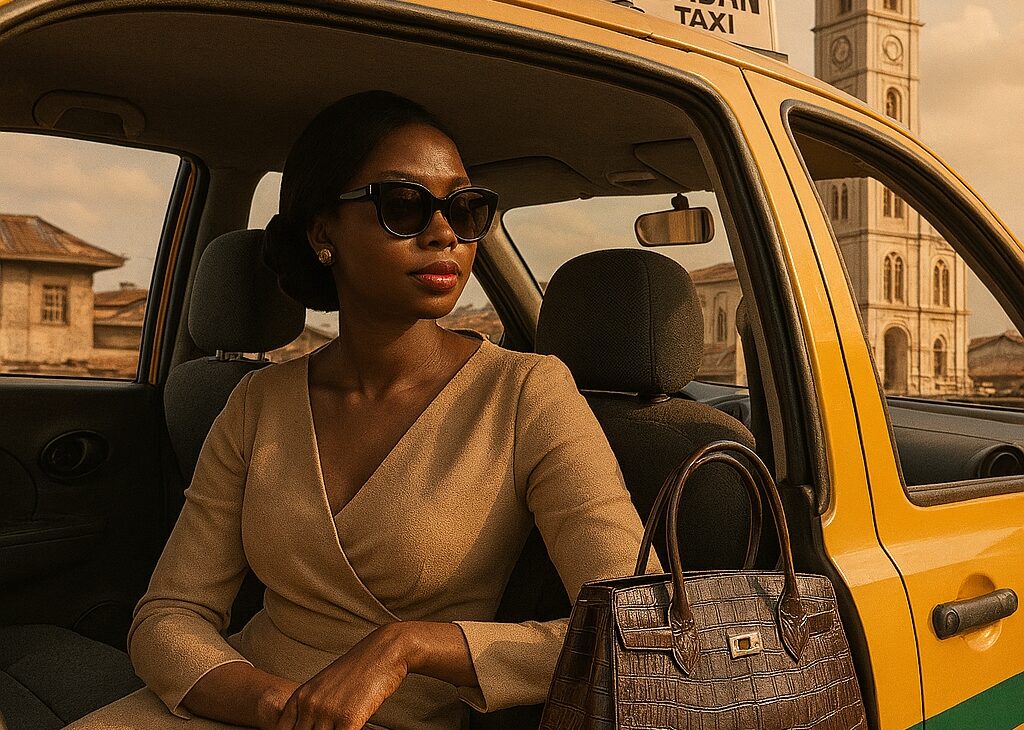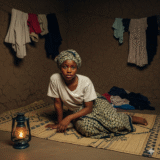The Return
This is a work of fiction. Names, characters, businesses, places, events, and incidents are either the product of the author’s imagination or used in a fictitious manner. Any resemblance to actual persons, living or dead, or actual events is purely coincidental.

The cream and maroon Nissan Micra, the characteristic colour of Ibadan taxis, ascends Mapo Hill. Seated comfortably in the back is a middle-aged lady; her appearance suggests a sophisticated woman, an untypical passenger of such taxis.
In Ibadan, she would belong to the upper class, the kind usually found in the backseat of chauffeur-driven cars.Everything about her exudes sophistication. From the Gucci sunglasses to the Rose Gold Chopard Heure du Diamant watch adorned with 6.96 carats of round-cut rubies and 0.23 carats of diamonds, every detail speaks of luxury. A gold-accented brown Hermès Birkin 35 Crocodile Leather bag rests on the seat beside her.Afeez, the driver, knows this is no ordinary woman.
At Molete, she was ushered into the cab by a man with a luxurious white beard, alighting from a black Mercedes-Benz SUV with tinted windows. As she settles into the seat, the scent of her perfume fills the car; it is unlike anything Afeez has ever encountered, differing totally from the usual odours of sweating market women with their baskets of pepper or dried fish. Had Afeez been from a higher social class, he might have recognized this as being from the rare vintage 1970s Christian Dior Diorama Parfum.
She requests air conditioning and closed windows. Afeez, surprised by her request, realizes that she isn’t used to this type of commute – Ibadan taxis don’t have air conditioning. It is also a signal that money, lots of it, would not be an issue as fare and he quickly abandons all thoughts of negotiating the fare. She speaks to him in the local dialect, asking to be taken to Beere.
As he drives, Afeez can’t help but wonder about the woman’s identity and her reasons for choosing such humble transportation. Stealing a gaze at his passenger, his eyes meet hers in the rearview mirror, and he quickly looked away. They are approaching the Cathedral on the Hill, a name by which Christ Church Mapo is otherwise known, when the lady asks him to turn into the gate of the expansive church compound.With a little grunt and jerk, Afeez’s car makes the turn and is brought to a halt.
His passenger comes out delectably, stepping on the pavement and heading towards the Vicar’s residence. He can see that she limps a little on her right leg, but the radiance from her shoes sparkling in the early morning sun attracts the eyes more than anything else. But then, she stopped, turning back to face the taxi. Her dark Gucci sunglasses concealed her eyes as she took a slow, deliberate gaze across the familiar grounds—from the stately blue and white painted columnar church to the Vicar’s house. She definitely has a deep connection to this place.
Moria takes a long sigh. This was where it all began for her, not all of it, but the significant event that shaped her life. For almost three decades, she has dreamed of this day, the day she would set foot on the soil of this church.
When the Agbekoya left her sprawling with a broken leg in the gutter, it was the timely intervention of the Vicar, who, as fate would have it, had been forced to take refuge in the back alley of her mother’s shop that fateful day, that saved her. He had brought her to this vicarage from where she was moved to the University College Hospital (UCH).
Her parents only got to know of what had happened to her when contacted by the Vicar. From here, she was sent to the Igbobi Orthopaedic Hospital in Lagos. The fracture was a major one and needed advanced care, something not available at Igbobi then. The alternative was amputation, and she and her parents had resigned to fate with a scheduled date for the amputation until, by a stroke of fate, the visit of Chief Ebikeme to his son, who was scheduled for a similar operation, changed her narrative forever. She was flown with Ebikeme’s son to the Massachusetts General Hospital (MGH) in Boston, which was witnessing a period of significant advancement in orthopedic care, for a reconstructive surgery.
She muses to herself as she thinks of the chain of events that had bestowed upon her a life she never would have dreamt possible. What if the fear of the Agbekoya had not left her with a broken foot? Would this Moria have emerged?She gets back into Afeez’s taxi and requests him to take her to her planned destination. She would still like to see what has become of her mother’s shop and the gutter she had fallen into that fateful day.
A streak of tears comes to her face as she thinks of the fact that her mother and father are now dead; she has never gotten to see them since she left for Boston. She knows she could have done better, though she made sure they never lacked anything, but her resentment and anger for the nation embittered her and kept her away from visiting all these years.
At the centre of the roundabout in Beere, the taxi comes to the Iba Oluyole statue. Moria has seen better imposing statues, but is impressed as this was not there in the years she lived in this area; the taxi takes to the left, heading on the Bashorun Ogunmola Road, bringing her to Mapo Hall.
Twenty-seven years is a very long time, and things have changed. The set of stalls she was hoping to see has all disappeared; in place of these stands a sprawling building, now the secretariat of the Ibadan South-East Local Government. With no stalls, the idea of tracing the gutter is moot.
But one thing that stands unchanged are the columns of the hall and the long flight of steps. She takes measured steps that lead her to the stairs and takes her seat on one of them. With her head held up within her two palms, she fixes her gaze on Oja’ba in the near distance, her attention on the one-storey building on the right.It all starts coming back to her as she is soon lost in thought.
It was a cold winter when she arrived in Boston, and her surgery and recovery had taken the better part of six months, following which she enrolled at college. The rest, as they say, is history. Luck had shone upon her, and she had risen to unprecedented heights as a realtor buying properties, renovating and selling them.
A blaring taxi horn snapped her out of her thoughts, anchoring her once again to the present. She glanced around, reminded of why she’d chosen this particular spot. With deliberate motion, she reached into her bag and retrieved her Palm Pilot, just as a sudden surge of clarity washed over her—the opening lines to the story she’d already titled Agbekoya: An Uprising Like No Other.
Her mind drifted to the Magna Carta, a cornerstone of liberty she’d studied back at Community College. That memory stirred something deeper, drawing from that inspiration, she began to write:
“Echoes of the past, thousands of kilometres away in England, were beginning to resonate in the quiet village of Akanran. The events that led to the Magna Carta, the cornerstone of human rights, were eerily mirrored in the lives of villagers across the Western State. In Akanran, however, the seeds of revolt were only just beginning to sprout.”
She stops, gathers herself up as she remembers Mulika who is expecting her in the building on the right. All she needs to do now is walk into the building. She has been told many stories about Agbekoya, but felt pushed to begin with Mulika’s, her story being not only compelling but revealing of what she felt could also have become of her, if not for that fracture. In Mulika, she sees herself and every little girl who inhabits this area.




Joe
Captivating story line…. I’ve been engaging my lil moments within the lines. Keen for the next chapter….
bimbo
Thanks Joe. I am putting the story out to gauge readers interest before publishing
Joe
Sure, a nice way to engage the readers👍…
Blessing
I’m waiting patiently for the next episode.
Welldone, sir.
Ohanugo Ernest
I like the way yeh second chapter started from a different angle and view. Sad though she never took our time to come back and see her parents.
Looking forward to the next chapter
bimbo
Absolutely and thanks for the feedback.
Raheem, Musa Ariyo
Let’s move to the next episode. I am keenly following you
bimbo
Alhaji, bawo? Hooe the book brought up good memories of the ancient city? Any noted opportunities to improve?
Ohanugo Ernest
September 6, 2025
Reply
I like the way the second chapter started from a different angle and view. Sad though she never took out time to come back and see her parents.
Looking forward to the next chapter
Samuel Aina
Seriously, you have me hooked. I cant wait to red 2hat happ3ns next. And, who is Mulika?
Tina Okwara
I am a bit confused, did she arrived in Ibadan before getting to Lagos. I think the arrivl in Lagos precede her ppearance in Ibadan.
bimbo
You are right there Tina. The chapter Lasgidi comes before The Return
Lola Bucknor
Applause! Applause!! Applause!!!
You should win an emergin writer’s award. This is positioning to be a good story…even greater for a movie, I think
Mama Popo
I reached this page by luck and reading this story from here in Zambia, its as if I know the character and places. Your descriptions are vivid. I cant wait to know what happens next.
Much love.
bimbo
Oh my God, from Zambia? Thank you for reading and commenting.
Wale Elekuru
… the story line might be fictitious but the setting, the streets, the names are so surreal. The historical city of Ibadan, you don’t appreciate its splendour until you are years away from it.
A place filled with everything imaginable- the good, the good and the good.
Thankful Mr. B
bimbo
Wale, thank you very much. The story is a mix of history with fiction. Home, my home. When shall I see my home? Remember the song?
Olumuyiwa Agboola
Another captivating chapter replete with enchanting details!
I was looking for information on how Moria managed to remain in Boston for 27 years after her medical treatment. And, it’s difficult to imagine that she did not get in touch with her parents in all those years!
bimbo
I think you should read “Lasgidi”, before this particular chapter “The Return.” You will get this much in a later chapter titled “The Swiss Affair.” She actually said that she took care of her parents, she just didn’t get to “see” them.
Thank you sir.